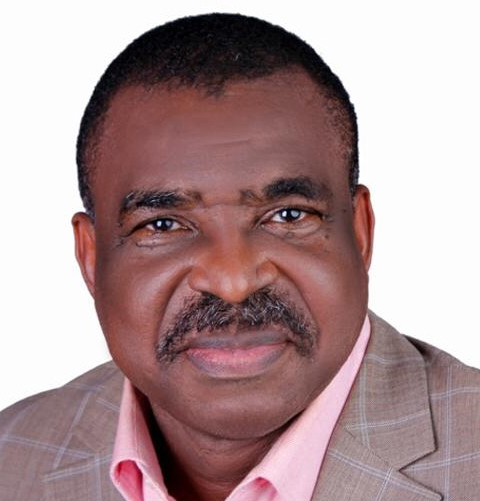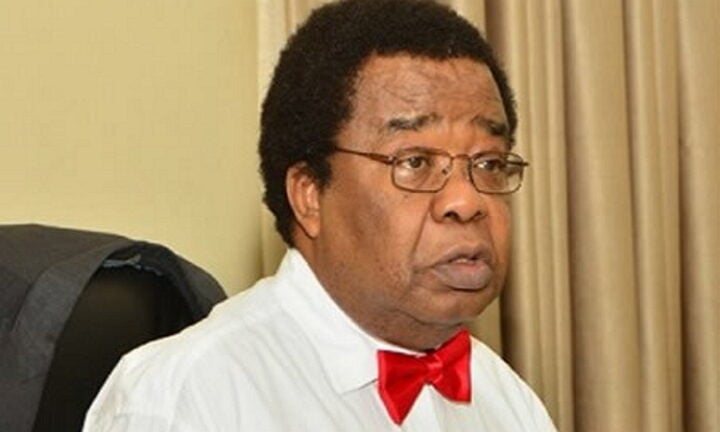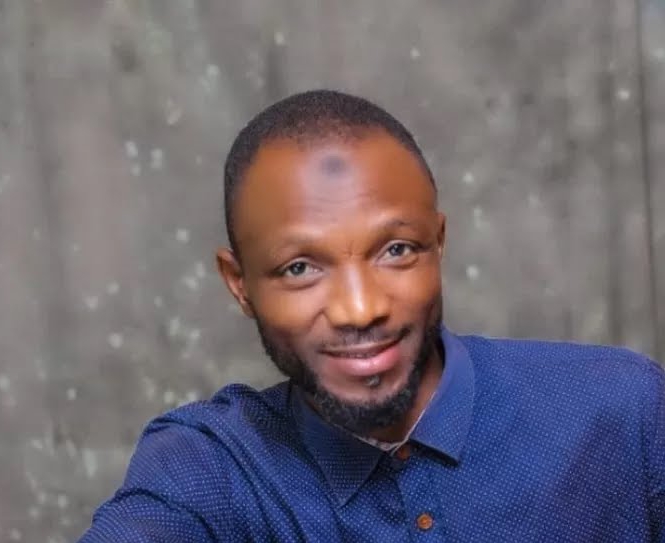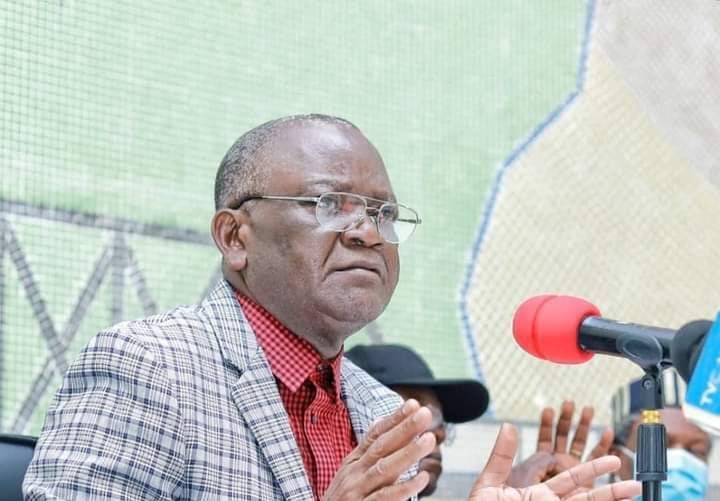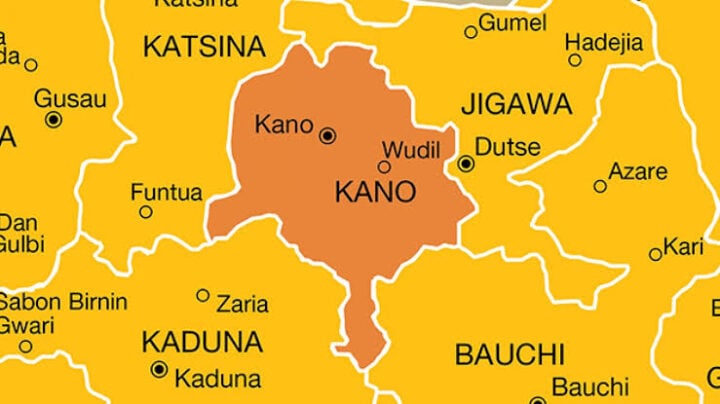Even at the octogenarian age of 80, professor Bolaji Akinwande Akinyemi still sparkles. He does so in many ways and especially with the program that he hosts and broadcasts on YouTube every Thursday, aptly titled “ThruMYeyes with professor Bolaji Akinyemi.”
For the information of those who are yet to become devotees/enthusiasts of the program, it is an interactive forum with a menu of current issues on international relations and foreign policy which the mercurial professor Akinyemi dishes out to his audience as the chief chef. And that is in addition to the fact that he was deputy chairman of the National Confab held in 2014 whose far-reaching recommendations have the capacity to change Nigeria for good.
The import of his active presence in the foreign relations space where he remains a towering figure is magnified by the fact that he exited the position of Nigeria’s Minister of External Affairs in excess of 35 years ago (1985-87).
Yet professor Akinyemi is still a force to be reckoned with at home by virtue of the critical role that he played during the 2014 National Confab and in 2007, as a member of the justice Mohamed Uwais Electoral Reform Committee set up by late Umar Yar’adua; and abroad, where his footprints in his chosen field of law and diplomacy remain larger than life.
Advertisement
Arising from the above, I can state without fear of contradiction that professor Akinyemi’s bones are ingrained with matters relating to international relations and affairs which by now must be a major component of his DNA since that is a space in which he has been both as a student and a practitioner for more or less 60 years of his 80 years sojourn on planet earth.
Is it not amazing that at the youthful age of 27, the intellectual powerhouse was already a professor? That is owed to his acquisition of outstanding academic laurels from some of the best educational institutions in north
America -the prestigious Fletcher School of Law and Diplomacy, Boston, USA, where he obtained a master’s degree and the highly acclaimed University of Oxford, England where he received his Ph.D.
With the hefty academic laurels in his kitty between 1975 to 1983, he was the Director-General of the Nigerian Institute of International Affairs, NIIA-a foreign policy think tank which was a natural fit for him to head for five years before having a stint as a professor of political science at the University of Lagos from 1983-85.
Advertisement
Subsequently, the military government that was not partisan, but rather keen on finding round pegs for round holes, did not hesitate in appointing him the minister of External Affairs at the young age of 33. Although he served as minister for a relatively short period of two (2) years, (1985-87) he made such a positive impact that his work has continued to shape our country’s foreign policy some 35 years after his eventful tenure.
Apart from the Technical Aids Corps (TAC)which was conceived and implemented under his watch to render assistance to fellow Africans free of charge and in the process bolster Nigeria’s leadership influence across the continent, professor Akinyemi is also the architect of the Concert of Medium Powers which is a trade and political bloc of medium power countries with regional influence that was being positioned to counterbalance, via collective bargaining, the overbearing activities of then supper powers – the USA and Russian over less powerful countries worldwide.
But European and other medium powers, most especially the likes of Sweden failed to buy into the concept, probably because, it was not propounded by one of their own, and perhaps owing to a contrived superiority complex that Europeans tend to assume that they have over Africans, they could not yield to the leadership of such a novel and positively disruptive initiative to Nigeria.
As a result of what l would like to term miasma of despair on the part of the potential beneficiaries of the concept in the developing world and the Western world tendency to collaborate with their neighbors and allies to exploit the underdeveloped world, particularly Africans, the otherwise excellent idea propounded by the erudite professor Akinyemi suffered atrophy.
Advertisement
Unbeknownst to the naysayers, professor Akinyemi was well ahead of his time. It is worth pointing out that the intendments of Akinyemi’s policy proposal to birth the Concept of Medium Powers, was later realized through the emergence of China in the global scene as a formidable force that has been playing a countervailing role which has had a moderating effect on diluting the suffocating influence of Europe and North America over global trade and politics, an agenda which the visionary Akinyemi was pursuing through the concert of medium powers an idea which he first propounded way back in 1987.
Without any iota of doubt, such a globally positively disruptive policy could not have sprung forth from any less an intellectual mind than that of professor Akinyemi who has drunk from the fountains of knowledge in both the Fletcher School of Law and Diplomacy at Tufts University, from where he obtained his master’s degree way back in 1966 barely a couple of years after l was born. It is noteworthy that the Fletcher School is an institution of learning that owes its establishment to World War ll. This is because it was after the war that the compelling need to set up an institution with specialization in global affairs to mitigate a future breakout of global war was addressed with the birth of the Fletcher School. It is also significant that professor Akinyemi, the man being celebrated is also a product of the University of Oxford, which is the flagship citadel of learning in Europe renowned for being the training ground for some of the world’s greatest thinkers.
Regrettably, Nigerian policymakers or public office holders are no longer as grounded as they used to be as reflected by the impeccable intellectual pedigree of Akinyemi, simply because the criteria for public office is no longer based on merit but on nepotism or partisanship.
The reversal in the fortunes of our beloved country is evidenced by the yawning gap between the way and manner our country is currently perceived Internationally, compared to the days when a well-grounded technocrat like Akinyemi was at the helm of affairs in foreign policy formulation desk, first as Director-General of Nigeria Institute of International Affairs, NIIA and later as minister of External Affairs where he was turning out superlative policies that rankled the supper powers and which made them hold Nigeria in awe due to the brilliant ideas emanating from our technocrats such as Akinyemi.
Advertisement
Because some of our public office holders like Professor Akinyemi were so well versed in their areas of primary assignments, they made international media headlines through their dynamic and groundbreaking ideas and concepts.
Such sagacity conferred on Nigeria, not just the prestige of being the leader of Africa, but also a formidable force on the world stage.
Advertisement
How can it be forgotten that it is based on the potency of the pioneering work done by the likes of professor Akinyemi in positioning our country as a bastion of hope for Africa with people bristling with bright ideas that could change the worst, that Nigeria was tipped to be a part of BRICS, which is a group of countries including Brazil, Russia, India and China (BRIC) an acronym of the nations identified by Goldman Sachs economist, Jim O’Neal in 2001 as countries that would dominate the world economy by 2050.
But following a series of political miscalculations that have bedeviled our country, not limited to, but particularly stemming from the failure of a military president, Ibrahim Badamasi Babangida, IBB (1985-1993) to keep to his promise to hand over political power to civilians in 1993 after MKO Abiola was believed to have won the presidential elections held on June 12 of that year; and instead of a more tyrannical military dictator, Sani Abacha, ascended the throne as military head of state.
Advertisement
His ascension was preceded by his ouster of Ernest Shonekan as interim head of state after IBB stepped aside, and the consequence of the upheaval was our country’s loss of the opportunity of joining that exclusive club of emerging economic and political power bloc famously known as BRIC at that time.
Remarkably, Nigeria’s loss was South Africa’s gain, as it was the S in South Africa, that got incorporated into the acronym to form BRICS.
Advertisement
That is simply because it is within the same period that the obnoxious apartheid that scourged the conscience of the world was killed, and therefore a precursor to the emergence of the late civil rights struggle icon, Nelson Mandela who got released from prison to become president of South Africa in 1994 after a long period of oppression of the black majority by a white minority.
Thus instead of BRINC with N, if Nigeria was chosen over South Africa, we dropped out of the league. And since then, owing to the sordid image of our country, both at home and abroad, the nation’s fortune has been on a downward spiral.
This is underscored by the fact that these days, Nigeria is only mentioned in the global media for the wrong reasons. As a person of impeccable character and pristine pedigree, one can not celebrate Professor Akinyemi without referencing his incorruptibility.
So as a breath of fresh air in the fouled sociopolitical atmosphere prevailing in our country, whereby the malfeasance of public office holders, stinking to the high heavens, is the new normal; Bolaji Akinyemi’s public service record can be an elixir of sorts.
His story, (history) is guaranteed to bring back the feelings of nostalgia about the brilliance and high voltage intellectualism that were once the hallmark of our public servants.
That is quite the opposite of the current narrative of financial malfeasance which is the trademark of a preponderance of our public servants, particularly the likes of Abdulrazaq Maina, the pension funds task force leader who re-looted stolen pension funds running into trillions of naira that he was tasked with recovering and ex petroleum resources minister, Deziani Allison-Madueke, whose jewelry allegedly acquired with stolen oil/gas money was recovered and sold for huge sums, the value of which would make the infamous Imelda Marcus of Philippines green with envy.
That the exploits of professor Akinyemi in exemplary public service to his fatherland are a touchstone of sorts in the annals of our beloved country, is not debatable.
For those that may not already be aware, it is professor Bolaji Akinyemi-ex Director-General of the Nigerian Institute of International Affairs, NIIA and former minister of External Affairs, that introduced the concert of medium powers-a conglomeration of medium power nations with the capacity and ability to promote trade between and amongst themselves by forming a global political block as a counterforce to the dominance of the superpowers who control the United Nations, UN, and other Supra National organizations as well as Bretton Woods institutions such as the IMF, World Bank, WTO, and related agencies being used to manipulate the world order.
But before shining more light on Akinyemi’s remarkable accomplishments as a colossus in international affairs, astute public servant, and purpose-driven leader of high integrity, allow me to digress a bit by highlighting the disconcerting state of affairs in our country arising from lack of a broad world view by our current leaders culminating in the mismanagement of our diversity. That is sadly the reason that our country is now mentioned in the same breathe with failed countries like Afghanistan, Iraq or Syria either for the rising tide of terrorism or listed alongside Libya, Sudan, Mali, and Ethiopia notorious for violence driven by the struggle by aggrieved members of the country seeking to be separated to form their own countries due to religious intolerance or ethnic rivalry between the multiple ethnic nationalities that constitute the country.
Despite the magnitude of corruption that is endemic in public service Bolaji Akinyemi, having been sired by a clergyman and educationist, Reverend James Akinyemi is an epitome of integrity. Hence, although he served in premium roles in government, he has no real estate assets like mansions in high brow neighborhoods of Ikoyi, Lagos, or Maitama, Abuja. Instead, he dwells in a modest home, not on the Island as most public servants of his caliber who attained the level of a cabinet minister, are likely to, but in the mainland of Lagos.
Compare him to the obscene situation whereby the immediate past petroleum resources minister, Diezani Alison-Madueke has been indicted for frittering away billions of oil money, some of which was used to acquire an obscene collection of jewelries and personal accouterments that got seized and which would make Imelda Marcus(Philippines infamous First Lady who acquired 3,000 pairs of shoes) green with envy.
And even consider the case of Abdulrasheed Maina, a pension funds task force chairman assigned with the duty of recovering looted pension funds running into trillions of naira, which he re-looted and anti-graft agencies uncovered and jailed him.
The negative effect of the heist by the pension funds looter, the compromised former minister of petroleum resources, and other corrupt public and civil servants may be adversely impacting the likes of professor Akinyemi who may not be regularly receiving their pension dues as retired public servants that served without blemish. The above assertion is underscored by the fact that with the legendary irregular payment of pensioners dues which is the dishonorable trademark of our government, honest retirees such as professor Akinyemi who did not dip their hands into public treasury to create personal retirement benefits for themselves by engaging in corrupt practices, maybe in jeopardy.
One lesson that l have learned from the story of professor Bolaji Akinyemi is that: military regimes did a better job picking appointees for technocratic posts than politicians simply because they were adept at casting their nets far and wide to find Nigerians with the best fit for the roles as Ministers and Directors General of Ministries, Departments, and Agencies, MDAs. And they did a good job hence a positive image of our country soared even if it was under military dictatorship.
The assertion above is validated by the fact that it was under military regimes that we had the likes of indubitable Professor Akinyemi leading foreign affairs ministry, the erudite professor Olikoye Ransome-Kuti heading the health ministry, and outstanding professor Babatunde Fafunwa being in charge of the education ministry. All of them were round pegs in round holes at different points in time under the watch of the military.
Apparently and understandably, our political leaders are unable to achieve such a high level of professionalism in appointments to strategic public offices owing largely to the need to be partisan by rewarding those who were in the trenches with them during elections and thus helping them to prevail over their opponents.
In my view, there is a need to strike a balance between professional politicians and professionals in politics in choosing various heads of MDAs in order to deliver on campaign promises made when seeking to be elected.
On a personal note, professor Akinyemi is my intellectual role model. It was he who influenced me, without his knowing it, to pursue a master’s degree program in Fletcher School of Law and Diplomacy because as a young impressionable man, l longed to plant his feet his footprints, career-wise.
After my academic pursuit in Fletcher, l had also planned to build on it by attending the University of Oxford for a doctoral degree as professor Akinyemi had done by obtaining his doctor of philosophy degree, Ph.D. from Trinity College, Oxford.
Having applied and was considered suitable by the authorities in the University of Oxford for the academic pursuit, l was torn between remaining in the political arena to harness the reward of my role in the emergence of late Umar Yar’adua as president in 2007, and sacrificing my ambition of obtaining a PhD from the University of Oxford as professor Akinyemi had done.
Regrettably, I opted for the former and lost the latter. Since then, as the conventional wisdom goes, a lot of water has passed under the bridge. It was Eleanor Roosevelt that once stated that “If life were predictable it would cease to be life, and be without flavor.”
Professor Bolaji Akinyemi is not only an intellectual role model but also a style icon. It was that popularized bow tie-wearing on a daily basis as opposed to wearing it only to weddings, for ball room dances or other special occasions.
As l watched him on television, l got so enamored and sucked in by his bow tie so much so that when l became a banker, l developed the knack for also spotting bow ties even to work on a daily basis. But my obsession with bow ties was scuttled by an overzealous executive director in the bank where l was working then, and who banned, with military alacrity, my wearying of bow ties to work as a banker.
Readers can now figure out who influenced me to the extent that the most popular photo of me that accompanies my published essays and book is the one where l am spotting a bow tie.
It is in the bid to permanently hold on to the memory of Professor Bolaji Akinyemi, my intellectual mentor, that l had the privilege of having him write the forward for my soon-to-be-released book: “Becoming The President of Nigeria. A Citizen’s Guide”
In conclusion, l would like the world to join me in wishing the effervescent foreign policy leadership icon, a maestro in political science, an administrator per excellence, and octogenarian who turned 80 on December 4, 2022, Bolaji Akinwande Akinyemi a very happy 80th birthday anniversary.
Magnus Onyibe, an entrepreneur, public policy analyst, author, development strategist, alumnus of Fletcher School of Law and Diplomacy, Tufts University, Massachusetts, USA, and a former commissioner in Delta state government, sent this piece from Lagos.
Add a comment
